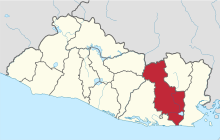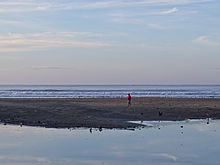| San Miguel | |
|---|---|
| Department | |
 | |
 Flag Flag Coat of arms Coat of arms | |
 Location within El Salvador Location within El Salvador | |
| Coordinates: 13°31′19″N 88°14′02″W / 13.522°N 88.234°W / 13.522; -88.234 | |
| Country | |
| Created (given current status) | 1824 |
| Capital | San Miguel |
| Area | |
| • Total | 2,077.1 km (802.0 sq mi) |
| • Rank | Ranked 2nd |
| Population | |
| • Total | 678,000 |
| • Rank | Ranked 3rd |
| • Density | 330/km (850/sq mi) |
| Time zone | UTC−6 (CST) |
| ISO 3166 code | SV-SM |
San Miguel (Spanish pronunciation: [ˈsam miˈɣel]) is a department in the eastern part of El Salvador. The capital is San Miguel. The department is 2,077 km in area and has a population of over 678,000.
Before the Spanish conquest of El Salvador, the territory that now consists of the departments of San Miguel, La Unión and Morazán was the Lenca kingdom of Chaparrastique (Place of Beautiful Orchids).
San Miguel was first known as San Miguel de la Frontera. The city was founded by Luis de Moscoso on May 8, 1530, where it is now Santa Elena. On July 11, 1812, the city was given the title of "Noble y Leal Ciudad" (noble and loyal city). It was made a department on June 12, 1824.
It is the location of Ciudad Barrios, the birthplace of Archbishop Óscar Romero.
Municipalities
- San Miguel Centro
- San Miguel Norte
- San Miguel Sur
Districts

- Carolina
- Chapeltique
- Chinameca
- Chirilagua
- Ciudad Barrios
- Comacarán
- El Tránsito
- Lolotique
- Moncagua
- Nueva Guadalupe
- Nuevo Edén de San Juan
- Quelepa
- San Antonio
- San Gerardo
- San Jorge
- San Luis de la Reina
- San Miguel
- San Rafael Oriente
- Sesori
- Uluazapa
Agriculture
| This section does not cite any sources. Please help improve this section by adding citations to reliable sources. Unsourced material may be challenged and removed. (January 2023) (Learn how and when to remove this message) |
The products that are more cultivated are the basic grains, henequen and sugar cane, fruits, oleaginous seeds, mangrove, and grass. The upbringing of bovine, swinish, goat, and mule livestock exists and the upbringing of corral birds and of bees. Among the most important manufacturing, there is the elaboration of nutritious products, threads, yarns, drinks, cotton fabrics, clothes, leather articles, detergents, soaps, milk, and construction material.
Tourism
There are a few beaches in the San Miguel department, such as El Cuco.
References
- Boland, Roy (2001). Culture and Customs of El Salvador. London: Greenwood Press. p. 13. ISBN 0-313-30620-6.
External links
| Capital: San Miguel | ||
| Districts |  | |
| Geography | ||
| Landmarks | ||
| Departments of El Salvador | ||
|---|---|---|
This El Salvador location article is a stub. You can help Misplaced Pages by expanding it. |